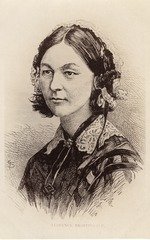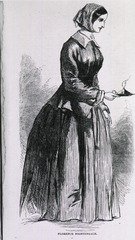June Book Review: Florence Nightingale’s Life and Legacy
By Adriana Suarez
Florence Nightingale is one of the most well-known figures in medicine. Often credited as the founder of modern nursing, she revolutionized the medical field with her reforms in patient care and sanitation.

Born May 12, 1820, to a wealthy British family, she was named after the city of her birth, Florence, Italy. Shortly after her birth, her family returned to England where they had two estates. Growing up, Florence would go into the village near the family’s estates to help tend to the sick and poor. At the age of 16, after receiving what she said was a message from God, Florence knew that nursing was her calling.
In 1844, against her family’s wishes, she joined the medical field by becoming a nursing student. At the time nursing was not considered a respectable position and her family did not approve of her choice in career. However, their objections did not stop Florence from pursuing her calling and she would go on to study nursing in Germany. After her time in Germany, she found her way back home to England and in 1853 she became the superintendent of the Institute for the Care of Sick Gentlewoman in London.

The turning point in her career would happen when she would assist the British troops during the Crimean War. In 1854, the Secretary of War of Britan sent a letter to Florence requesting that she gather a group of nurses to aid the injured and ill soldiers. Reports from journalists revealed that the conditions of the British base hospital were bad, and as a result, there was a public outcry demanding that more aid be sent to the soldiers. Florence quickly responded to the request and assembled a crew of nurses. With 38 nurses alongside her, she traveled to the base hospital in the city of Constantinople. Upon arrival she was appalled by the awful condition of the hospital. Communicable and infectious diseases were high among the soldiers due to poor hygiene and a lack of medicine and resources. In fact, it was discovered that more soldiers had died from disease than from battle injuries.
Under her leadership, the nurses worked fast to improve the conditions of the hospital. Florence ordered every room to be cleaned, patients to be bathed and changed, and nurses to wash their hands often. In addition, she established various practices for the hospital to follow such as having a cook, a laundry room, and a variety of recreational activities for patient well-being. At night, she would walk around with a lamp to aid and check on patients, which earned her the nickname, “The Lady with the Lamp”.

Over the course of the war, Florence travelled to the hospital several times. During her time there the death rate reportedly fell from 60% to 42% to nearly 2%. Her sanitation efforts were largely successful as conditions greatly improved in the hospital.
After the war, Florence established the Nightingale School of Nursing at St. Thomas’ Hospital in London. The school opened in 1860 and was the first of its kind, providing formal, secular education. At the time of its opening, Florence Nightingale had become a public hero and her life’s work had changed the public’s perception of nursing. Nursing was no longer seen as an unsuitable job but rather as a respectable and honorable career. As a result, many young women, including upper class women, enrolled into her nursing school. The school and its practices would become a blueprint for health institutions and patient care.
Florence’s work continued until her final years. She published many works, including a book titled, “Notes on Nursing”, which served as a guide for anyone caring for sick individuals. In addition, she mentored Linda Richards, the first professionally trained American nurse who would go on to transform nursing in the United States.
Despite being bedridden for many years, Florence lived a long, successful life. She died on August 13, 1910, at the age of 90.
Today, she is still remembered for her contributions to the field of nursing. Every year, International Nursing Day is celebrated on her birthday, May 12.
If you are interested in learning about medical history, come visit the library and view our display on nursing, which is part of our exhibit on the history of modern surgery. The library also has several titles on the history of nursing and medicine that are available for you to check out.
Titles include:
- Nurse: Science, Politics, and the Transformation of American Nursing by Dominique A. Tobbell
- The Doctor Was a Woman: Stories of the First Female Physician on the Frontier by Chriss Enss
- The Doctors Blackwell: How Two Pioneering Sisters Brought Medicine to Women and Women to Medicine by Janice P. Nimura
- Women In White Coats: How the First Women Doctors Changed the World of Medicine by Olivia Campbell
- Florence Nightingale: 1820-1910 by Cecil Woodham-Smith
- History of Medicine: A Scandalously Short Introduction by Jacalyn Duffin
- Empire of the Scalpel: The History of Surgery by Ira Rutkow

